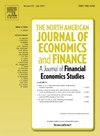全球经济政策不确定性的共振效应:一个时频分析
IF 3.9
3区 经济学
Q1 BUSINESS, FINANCE
North American Journal of Economics and Finance
Pub Date : 2025-04-23
DOI:10.1016/j.najef.2025.102437
引用次数: 0
摘要
本文通过经济政策不确定性(EPU)在全球11个主要国家的共振效应对全球系统性风险进行了研究。我们提出了一个理论框架来解释各国之间潜在的EPU相互关联以及它们如何随不同时间尺度而变化。在实证分析中,我们使用了1997年1月至2024年2月的326个月的EPU数据,并将时间序列分解为高、中、低频分量,以提供多尺度视角的见解。然后应用随机矩阵理论(RMT)来分析这些相互关联出现的频率范围。结果表明,各国之间的EPU存在很强的相互关联,相关性的来源因频率而异。值得注意的是,在低频时,相互关系是最明显和高度鲁棒的。它表明,长期经济政策趋势和全球经济状况对各国产生了重大而广泛的影响,突出了全球经济的相互联系性质以及在国际经济政策制定中考虑这些相关性的重要性。本文章由计算机程序翻译,如有差异,请以英文原文为准。
The resonance effect of economic policy uncertainty worldwide: A time–frequency analysis
This paper investigates global systematic risk through the resonance effect of economic policy uncertainty (EPU) across 11 major countries worldwide. We propose a theoretical framework to explain the potential cross-correlations of EPU between countries and how they may change with different time scales. In the empirical analysis, we use 326 months of EPU data from January 1997 to February 2024, and decompose the time series into high-, medium-, and low-frequency components to provide insights from a multi-scale perspective. Random matrix theory (RMT) is then applied to analyze the frequency ranges where these cross-correlations emerge. The results reveal that strong cross-correlations in EPU across countries exist, with the source of the correlations varying by frequency. Notably, the cross-correlation is most pronounced and highly robust at the low frequency. It suggests that long-term economic policy trends and global economic conditions have a substantial and widespread impact across countries, highlighting the interconnected nature of global economies and the importance of considering these correlations in international economic policymaking.
求助全文
通过发布文献求助,成功后即可免费获取论文全文。
去求助
来源期刊
CiteScore
7.30
自引率
8.30%
发文量
168
期刊介绍:
The focus of the North-American Journal of Economics and Finance is on the economics of integration of goods, services, financial markets, at both regional and global levels with the role of economic policy in that process playing an important role. Both theoretical and empirical papers are welcome. Empirical and policy-related papers that rely on data and the experiences of countries outside North America are also welcome. Papers should offer concrete lessons about the ongoing process of globalization, or policy implications about how governments, domestic or international institutions, can improve the coordination of their activities. Empirical analysis should be capable of replication. Authors of accepted papers will be encouraged to supply data and computer programs.

 求助内容:
求助内容: 应助结果提醒方式:
应助结果提醒方式:


